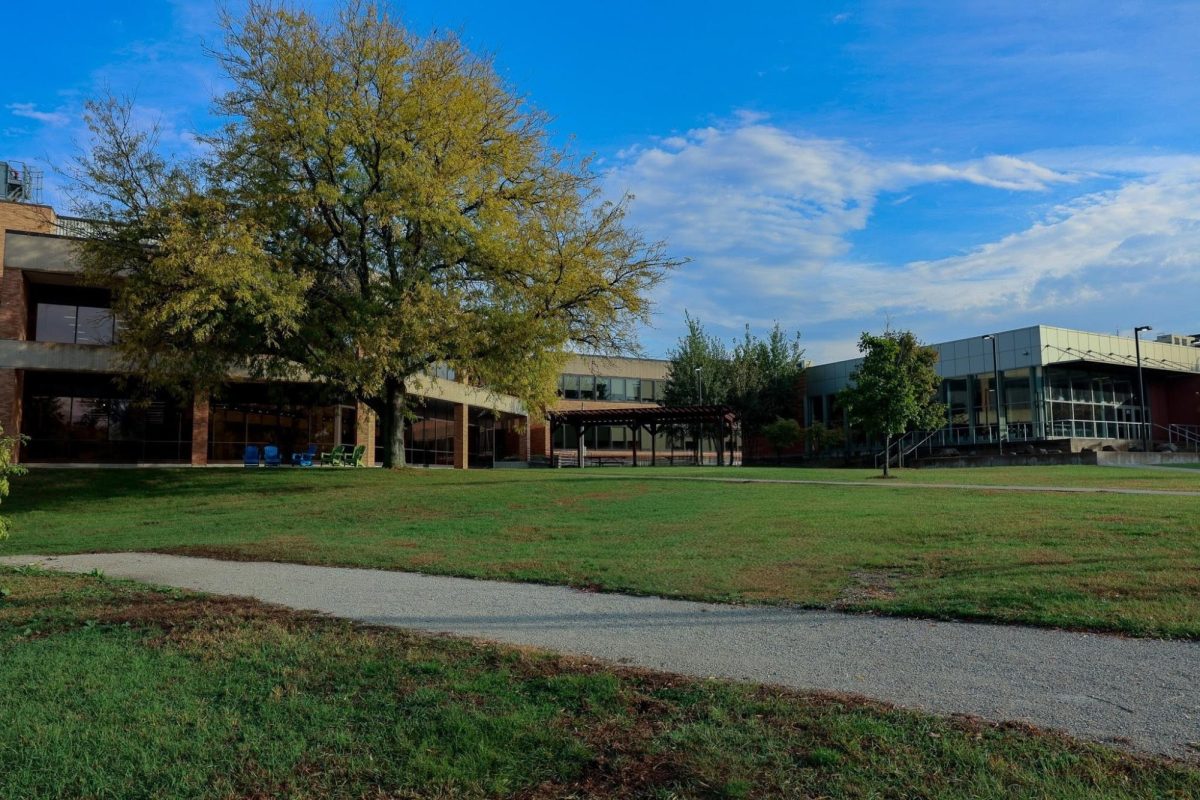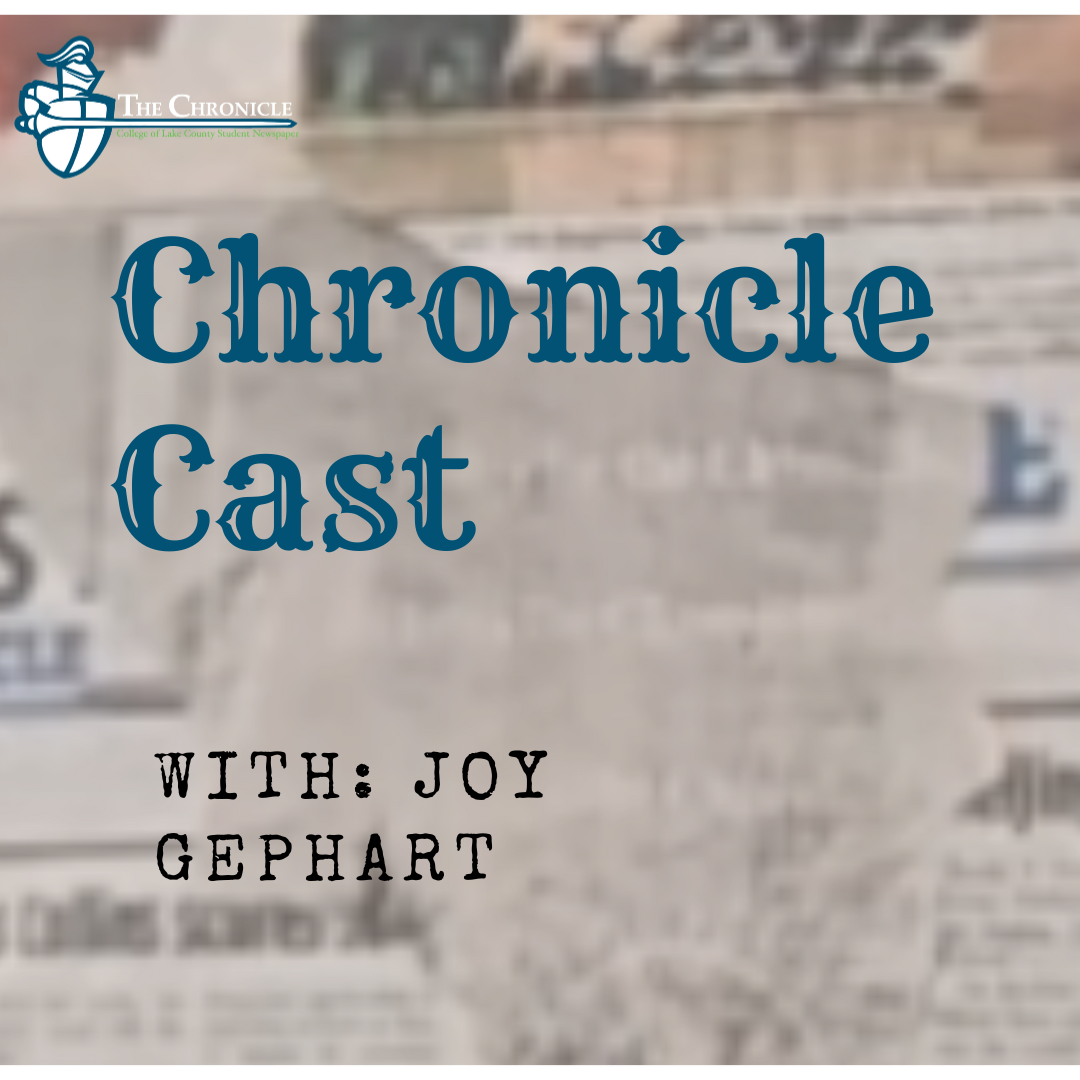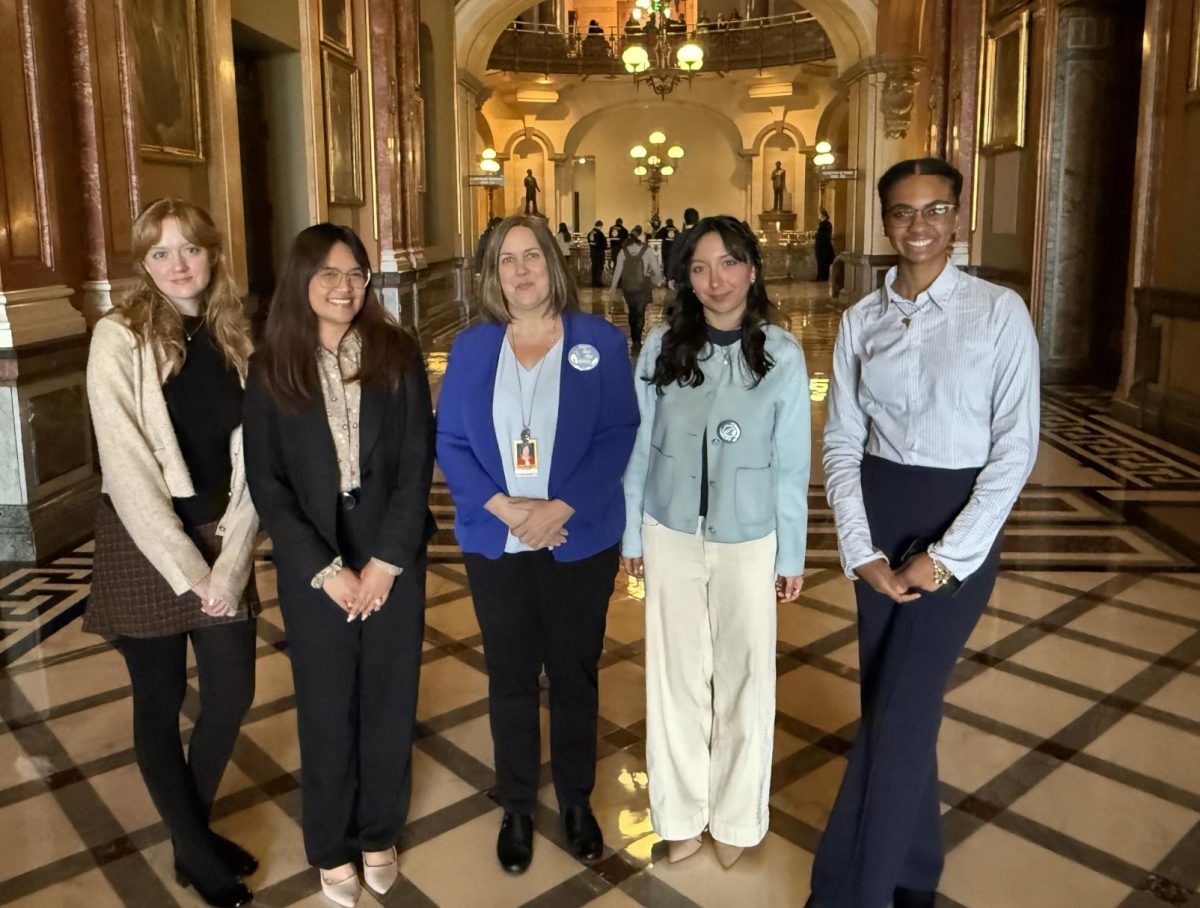The College of Lake County this fall discontinued its Honors Program, citing low enrollment, though some participants question how well it was publicized by CLC.
Nicholas Schevera is an English professor in charge of coordinating CLC’s Honors and Scholars Program. He reflected on the challenges leading to the program’s discontinuation. For Schevera, establishing the Honors Program was “an uphill battle from the very beginning.” More than 20 years ago, he recalled faculty and administrators expressing concerns that the program might not be inclusive toward the broader student body.
The Honors Program offered the same courses as regular classes but with smaller student numbers and a more engaging, enriching experience – earning students recognition from top schools. As part of the Honors Program, students received $50 per credit hour for each honors course they enrolled in. Honors Program admission for freshmen required a 3.5 GPA, with a recommended SAT score of 1200+ or ACT score of 25+. Current students needed a 3.5 college GPA and at least 12 completed credit hours.
The program offered three to four classes each fall, with new options resetting in the spring. Schevera pointed to the program’s structure as a reason for low enrollment, as students often found that the classes they wanted didn’t fit their schedules. Since each honors course was only offered once per semester at a fixed time, many students struggled to make it work.
When the program was discontinued, Schevera recalled students’ regrets.
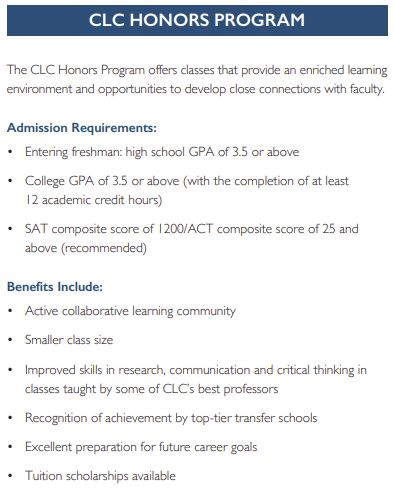
“Students were saying, ‘I wanted to be in the Honors Program. I wanted to take honors classes.’ I thought, ‘Where were you when I was trying to get students to enroll?” he said. “‘That’s the time I’m taking biology. Can we change it?’ Well, no, we want to make it the same every semester so there’s some consistency with it.”
To try to improve things, Schevera made several changes to the program over the years to increase faculty involvement and student enrollment. At one point, students could sign a contract with a faculty member to create a special honors section within a regular class, allowing them to do different work. However, this approach was eventually dropped because it went against the program’s goal of building a community of learners.
Schevera said recruiting 20 students himself for the Honors Program this fall was tough, as it has been in previous years. Vice President of Education Kristen Jones, stated in an email that 27 students enrolled in Honors courses in the 2024 spring semester. For fall 2024, 52 students enrolled. Schevera contacted students through email and worked with Academic Success Advisors (ASAs) and administrators to share brochures and program information. Despite these efforts to promote the program, he saw a lack of student engagement toward the program.
He also attempted promoting the program by visiting high schools, but this was not very effective, as many students either did not qualify or were not interested. Many students have said they didn’t know the Honors Program existed, even after meeting with their ASAs.
Jones and Schevera met and began weighing their options. The program must meet a minimum enrollment to cover costs, and falling short of this number raised concerns about whether the program should continue.
“When we were thinking about Nick’s limited time, our donors’ limited money, and how much interest that we’ve generated between the two programs, it just made more sense to focus our time, energy and resources into the Scholars Program, as opposed to the Honors Program,” Jones said.
The end of the Honors Program has brought attention toward the loss of opportunities available for students. Katherine Torres, president of Student Government Association, is a member of the Honors Program as well as the Scholars Program.
“The Scholars program is the only thing left that students have in regards to a rigorous course load and [gaining] financial aid while doing so,” she said. “As someone part of
the Scholars Program, I can’t be more grateful. I’m attending college for free, but I don’t think it’s correct how Scholars is very competitive, and now that is all that’s left for students.”
Jones said the Scholars Program currently has 16 students, and gets an average of about 25 applicants each year.
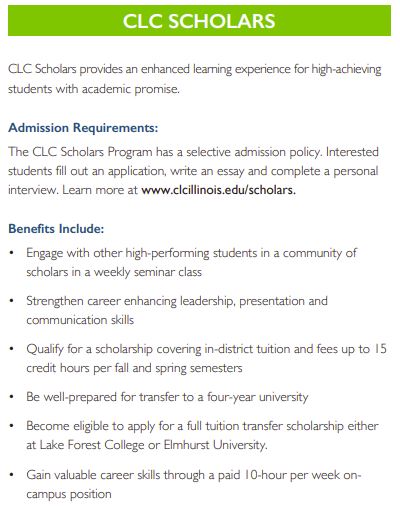
The Scholars Program, also led by Schevera, runs for two hours a week over four weeks. The goal of the program is to provide students with a toolset for their career path. It follows a seminar-style format taught by three professors, with a unique theme each semester–this semester’s being “Misinformation and Democratization of Information.”
Instead of traditional lectures, the program encourages open discussions. Schevera said while four-year schools have similar capstone seminars, this class style is uncommon at community colleges. Guest speakers also join lectures to share their career journeys and insight.
Admission to the Scholars Program for incoming freshmen requires a high school GPA of 3.5 or higher and an interview with Schevera. For current CLC students, a GPA of 3.5 or higher based on at least 12 academic credit hours and an interview with Schevera is required. While an ACT composite score of 25+ or an SAT composite score of 1200+ is highly recommended, it is not required.
Being a member of one or both of these programs opens up scholarship opportunities at other colleges students may want to transfer to.
“Elmhurst University asks me to pick the student for the scholarship, and who am I going to choose?” Schevera said. “I’m going to pick someone I know well, and the ones I know best are the Scholars students. At Lake Forest, they make the final decision, but they ask me to rank the students and often base their choice on that ranking.”
The Scholars Program has faced some criticism from students for its limited options. In contrast, the Honors Program has been celebrated for its range of courses across disciplines, from English to Science.
“The Honors Program was far less difficult to get accepted into and provided the opportunity for more diverse, challenging classes while having the class be reduced in price,” Torres said. “There needs to be more done for students who want the opportunity to be academically challenged while being able to afford to attend college.”
A recurring issue raised by students was the lack of effective communication between faculty and students about the program’s discontinuation. However, it appears that students weren’t the only ones left unaware. One student, who requested anonymity because of their participation in both the Honors and Scholars programs, said that during an October tabling event at CLC’s Grayslake campus, a representative from Lake Forest College also seemed uninformed about the program’s cancellation.
“I was talking to Lake Forest College, and they were telling me they would love to give scholarships to students in the Honors programs, and I had to tell them that the program is ending next semester,” the student said. “So it seems it was not communicated effectively even at a higher level because not even the colleges around Lake County – and those that have good partnerships with CLC – even knew about its cancellation.”
However, Schevera said he and his team have made an effort to inform students and faculty about the program being discontinued.
“I tell the faculty that are teaching the classes that it’s discontinued, so that they notify the students,” Schevera said. “If anybody emailed me, then I would just tell them. I asked PR to take down any information about the Honors Program so students wouldn’t be confused.”
“We also informed financial aid and the student onboarding so that our advisors and career and college navigators are more aware that they weren’t offering the classes anymore,” Jones added.
The student said finding information about the Honors Program online and through their high school counselor was difficult. However, when they did their own research, they found the effort worthwhile as the class dynamics delivered more than they had hoped for when enrolling.
“I really wanted a curriculum that was above the regular one in a community college, and to meet other students who are also wanting to be in that environment,” the student said. “I really like the people I met in class. You have to be with classmates that love to discuss and share their opinions based on the reading or lecture.”
This student also expressed worries over the program’s discontinuation and its potential impact on the college’s reputation.
“I’m worried CLC may be going backwards since many other community colleges have Honors Programs,” the student said. “These programs are so helpful for students to challenge themselves and get into higher-level schools.”

Several Illinois community colleges offer Honors programs in addition to their regular curriculum. These include College of DuPage, which offers two honors systems – Honors Classes and Honors Scholars – with varying benefits and requirements. Other colleges with honors opportunities include Elgin Community College, Oakton College, and Heartland Community College.
Nonetheless, Schevera assures CLC students that there remains opportunities for students to challenge themselves at the college, adding that it was their responsibility to be active.
“If students are gonna be passive and not do anything, then of course it might not be challenging,” he said. “If they really engage in classroom discussions, then that can really provide them with a really fascinating and interesting classroom experience.”
Martha Lally, professor of psychology, added that there are other avenues for students to engage with the college.
“There are many ways students can enrich their experience at CLC,” Lally said. “They can do this by actively engaging with their course material, joining student clubs and organizations, such as the Student Government Association, and interacting with their professors, both during and outside of class. Many College committees and councils have a spot in their charter for students to participate, and this is an excellent opportunity to learn leadership skills and enhance critical thinking and problem-solving abilities. Working as a tutor and research opportunities are provided on campus, and interested students can contact individual professors for information. Lastly, students can participate in Phi Theta Kappa (PTK) and the Honors Scholars Program for extra enrichment opportunities.”
Rebekah Niese, a CLC Honors Program alumna, is advocating to save the Honors Program through her petition, Save the CLC Honors Program: Preserving Diversity, Excellence, and Opportunity. As a student who faced financial challenges, she credited the program with helping her achieve her academic goals while encouraging her to push beyond her limits.
“Suspending this program would deprive countless students of a life-changing opportunity, leaving an irreplaceable void in the CLC community and undermining the core values of the institution,” Niese said.


